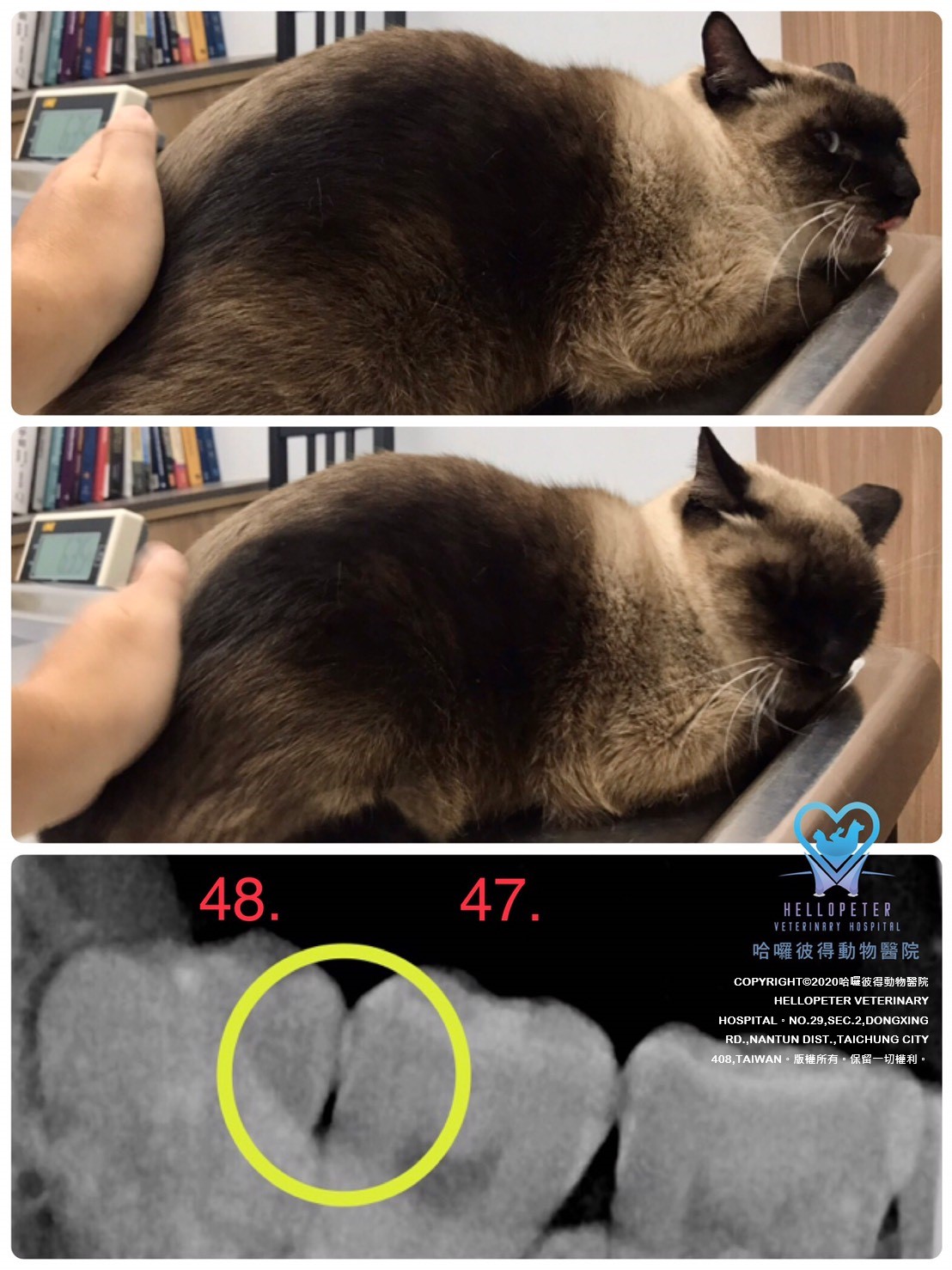



Because most dental and oral diseases in companion animals are closely related to the morphology, arrangement, and presence of teeth, these issues cannot be improved solely by internal medicine such as medications or injections. They require surgical intervention to address the underlying causes. That's why veterinary dentistry is considered part of the surgical system.
According to clinical statistics, topical medications penetrating into the gingival sulcus and periodontal pockets can have a "maximum effectiveness of 4%" at the affected site. Simply applying medications to the gums or taking oral medications has almost no therapeutic effect on teeth.
Different veterinarians may have varying opinions based on their experience in treating specific conditions. However, these perspectives should always be grounded in medical knowledge and empirical evidence.
As an example, consider the dental X-ray of my wife's wisdom teeth. The circled area represents the overlapping of teeth 48 and 47 in the FDI numbering system. Two different dentists provided different opinions:
Dentist A assessed that the wisdom tooth must be extracted because 48 is overlapping with 47, potentially leading to difficulty in managing the space. Over time, accumulation of bacteria in the overlapping area could result in interdental caries, and attempting to preserve the teeth may potentially lead to subsequent issues such as periodontitis..
Dentist B evaluated that tooth 48 is not a horizontally impacted third molar. If it grows fully without inflammation or cavities, it can be left in place temporarily. Adequate cleaning and maintenance (daily proper brushing, flossing, etc.) are essential. If dental implants are needed in the future, tooth 48 can be used as an auto-dental transplantation.
Dentists cannot assure patients that taking a particular medication or applying a certain substance on teeth and gingiva will solve issues like wisdom teeth or periodontal problems. The reason is simple: "Dentistry is surgery, and surgical intervention is necessary to address the underlying causes. Internal medicine is only supplementary."
When treating dental or oral diseases in dogs and cats, I maintain a consistent approach. Post-dental surgery, animals may experience reduced appetite due to pain, affecting their quality of life. To prevent wound infection, I typically prescribe an appropriate dosage of oral analgesics and antibiotics based on the individual case's liver and kidney conditions. This aids in a faster recovery, but it does not mean that dental problems can be solved solely through medication.
#The cat who loves to be touched on the buttocks after treating stomatitis.
# Dentistry is a surgery.
HelloPeter Veterinary Hospital Official Website:www.hellopeter.com.tw
For more articles or cases on veterinary dentistry by Dr. Chung-Wei Chen, you can visit our Facebook, and the "Dr. Chen Talks About Teeth and Oral Cavity" column on our official website.
HelloPeter Veterinary Hospital
Phone: +886-4-2472-8828
Address: No. 29, Sec. 2, Dongxing Rd., Nantun Dist., Taichung City 408, Taiwan
Hospital Hours: Monday to Friday 10:00~20:00 (by appointment only), 12:00 to the end of all appointments on Saturday, Closed on Sunday
#哈囉彼得動物醫院 #陳重威獸醫師 #阿威獸醫師的開口啟齒 #狗貓兔牙科 #狗貓兔口腔外科 #動物口腔外科 #高雄醫學大學 #口腔衛生學 #牙科X光 #洗牙 #口鼻廔管 #植牙 #GTR #動物植牙 #GBR
#MucogingivalReplacementSurgery #MGRS #牙齦黏膜置換手術 #Gingivectomy #口炎 #貓口炎 #動物牙科 #小動物牙科 #獸醫牙科 #寵物牙科 #台中動物醫院 #台中獸醫 #獸醫 #動物口腔外科 #動物齒科 #牙科 #動物醫院 #南屯 #台灣 #臺灣 #Taiwan #veterinarin #vet #VeterinaryDentistry #hellopeter #HelloPeterVeterinaryHospital